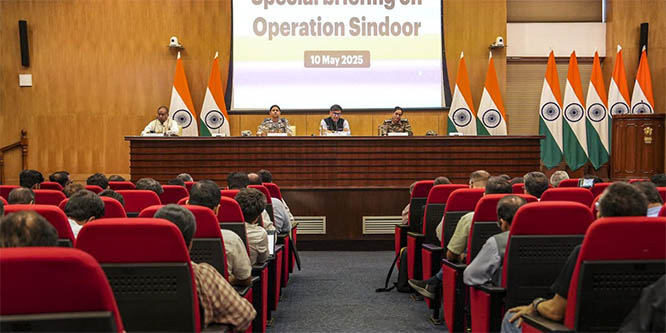
New Delhi, May 2: Depletion of groundwater and its increasing pollution could be leading to a silent, nationwide public health crisis as aquifers in many stretches across India are becoming unfit for drinking, according to the government's own figures.
Data submitted in Parliament by the water resources ministry on Monday shows groundwater in pockets of 158 out of the 639 districts has gone saline. It says in pockets across 267 districts, groundwater contains excess fluoride; in 385 districts, it has nitrates beyond permissible levels; in 53 there's arsenic and there's high level of iron in 270 districts.
Besides this, aquifers in 63 districts contain heavy metals like lead, chromium and cadmium, the presence of which in any concentration poses a danger.
The record submitted in answer to a question by Congress MP Shruti Chowdhry presents a countrywide map of where groundwater has become unfit for drinking and where contamination levels have breached government standards of safety.
In Delhi, a number of areas are not safe to draw groundwater from. Aquifers in north, west and southwest districts along the Najafgarh drain contain lead. The southwest district has cadmium and northwest, south and east Delhi have chromium, rendering the water not just bad but dangerous to drink.
Adding to the danger is the fact that only about 65% of the city's population (predominantly in the better-off localities) is serviced by the water supply system of Delhi Jal Board. Besides heavy metal contamination, fluoride has been found in aquifers in New Delhi and those in east, central, north, northwest, south, southwest and west Delhi.
Apart from these, areas in east, central, New Delhi, northwest, south, southwest and west contain nitrates.
The stealthily growing health crisis could be worse in rural India where facilities to even detect chronic health problems arising out of water contamination do not exist. Nearly 80% of India's rural drinking water comes from underground sources.
Drinking fluoride-laden water beyond safe levels can lead to fluorosis which hits teeth and bones. Arsenic causes problems in the nervous system, reduces IQ level in children and in extreme cases can also cause cancer. Chromium is a known carcinogen. Presence of nitrates in drinking water leads to what is commonly called as blue baby disease which hits infants and can lead to respiratory and digestive system problems.
These chemicals have appeared in the water sources either due to too much water being drawn from deeper and deeper in the ground, or due to industrial and human waste contamination.
Arsenic and fluoride are typically found in groundwater where chemicals have leeched from the bedrock due to over-exploitation of the source. Heavy metals are likely to flow in from industrial waste dumped untreated into water-systems. Nitrates are likely to appear in groundwater because of excess or repetitive use of fertilizers over time.
Government reports have shown that water withdrawal from underground aquifers is higher than the annual recharge levels in almost 15% of the country's geographical area. The number of wells are increasing rapidly and so are the depths to which people are plumbing to bring water out as the sources dry up.








Comments
Add new comment